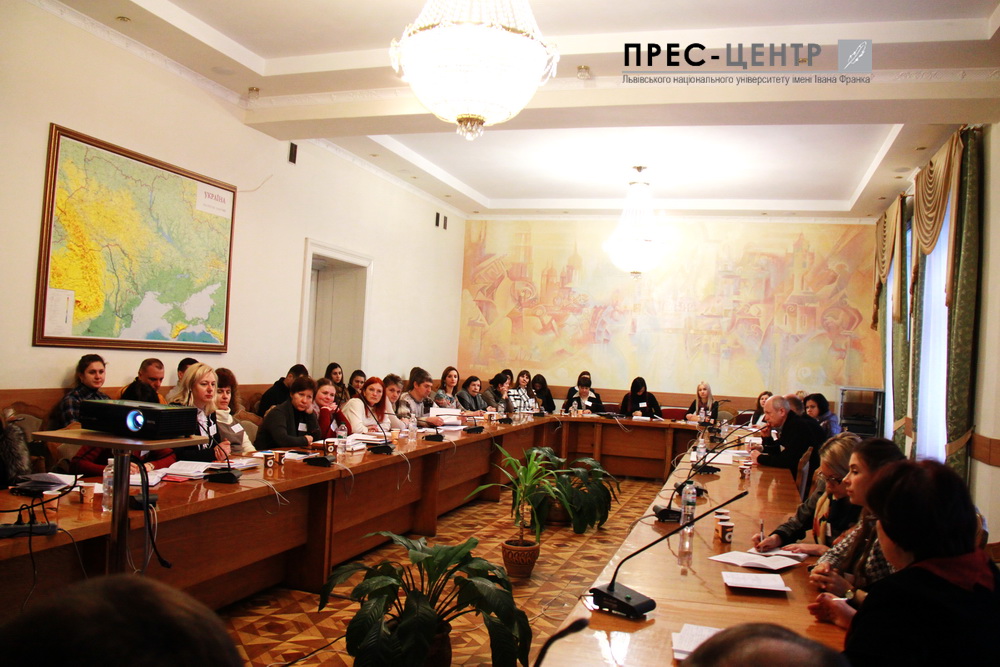
December15-16, 2016 the faculty of philology united scientists from five countries, nine universities and two research institutions of Ukraine, Lviv philology students as well as students from Kharkiv, Kropyvnytskyi, Khmelnytskyi and Kherson universities. The participants of the conference “Sociolinguistic knowledge as a means of creating a new culture of safety: Ukraine and the world” discussed some issues related to the interaction of speech, communication, politics and national security. The International conference, which continued the tradition of twelve nationwide sociolinguistic seminars, was conducted by the Centre for Information and Documentation of NATO in Ukraine.
The main objective of the conference was to discuss the current state of sociolinguistics, the prospects of its categorical framework, including the disclosure of interdisciplinary nature of the new concept of “strategic communication” and determining aspects of its analysis in linguistics.
In a video message to the participants of the Conference, Ivanna Klympush- Tsyntsadze, Vice Prime Minister for European and Euro-Atlantic integration of Ukraine noted the role of strategic communication in Ukraine and the world, stressing the need to study it.
The participants of the conference were welcomed by Marian Lozynskyi (Vice-rector for scientific and pedagogical work, social issues and development), who stressed the great importance of the university cooperation with the Center for Information and Documentation of NATO in Ukraine. Dean of the Faculty of Philology Sviatoslav Pylypchuk told about the prospects of sociolinguistics at the faculty of philology, the only in Ukraine, which has a specialization of sociolinguistics “Political Communication”, noting the role of discussions among researchers for the development of this new categorical framework for Ukrainian research universities directly.
Professor Galina Matsyuk started talking about modern Ukrainian sociolinguistics that responds to the request of the National Security Strategy (2015) to develop opposition to information-psychological war and promote a safety culture by studying such new concepts as “strategic communication”, which provides interdisciplinary study and sociolinguistic approaches.
December 15, at the plenary session the speeches were given by Natalia Nemylivska (Director of the NATO Information and Documentation in Ukraine); Mark Leti (specialist in strategic communications of NATO (webinar); Dr. Lada Roslytska ( a consultant on strategic communications DCAF (Canada); Dr. Susan Grassmann (Switzerland); Associate Professor Valeriy Korol and Associate Professor Gregoriy Lyubovets ( Linguistic Research Center of Military Institute of Kyiv National Taras Shevchenko University).
Also during December, 15 there was held the meeting of two sections “Language, communication, Ukrainian society: the formation of a new culture of safety” during which 22 speakers from various universities revealed linguistic situation, problems concerning the renaming of public space, the formation of national identity, speaking of different social groups and other topics. The problems being discussed at these sections associate with the topics of the second plenary session that took place December 16.
One of the approaches of the conference organizing committee headed by Professor Yaroslav Garasym is meeting of the students’ discussion groups. Hence, in room 308 there was a meeting of the first two discussion groups, namely: “Language, politics and communication in the Ukrainian society: the genre, lexical and stylistic and sociocognitive indicators” and “Language, public opinion and propaganda: the interaction in terms of Ukrainian reality”.
There have been working 14 students from Lviv University and 8 students from Kharkiv, Kropyvnytskyi, Khmelnytskyi and Kherson universities. After short reports on the results of their research, students debated about political relationship communications and National Security and the interaction of speech, public opinion, propaganda of information security. The moderator for this group was Dr. Lada Roslytska.
The sitting of the third and fourth discussion groups was devoted to the issue of “Language and Identity: Past, Present” “Language and political actors: interaction in online communication” (rm. 246 b). Students were looking for answers to the questions about the interaction of language and identity as a factor of national security, the features of the relationship of language, social media and information security. The moderator of the discussion groups was Professor Galyna Matsyuk.
December 16 there worked the third and fourth sections of researchers: “Language, politics, communication, mutual influence in different cultures” and “Communication in society: multidisciplinary aspects of research” and held its second plenary session entitled “Interaction between the concepts of “language”,”politics”, “national security” as a basis for the study of strategic communication in sociolinguistics”. The speeches were done by Prof. L. Vasylyeva (Department of Slavic Studies), Prof. G. Matsyuk (Department of General Linguistics), Prof. S.Sokolova (Institute of Ukrainian National Academy of Sciences of Ukraine), Prof. L. Masenko (National University of “Kyiv-Mohyla Academy”); senior researcher L. Azhnyuk the Institute of Linguistics of Potebnya NAS of Ukraine.
During the report section the supervisors noted the results of the research of young linguists of our University – associate professor A. Chuchvary, assistant A. Butkovskyy, postgraduate student M.Saletskyi etc. Within the International sociolinguistic conference there was resolved that the participants stressed the need to develop sociolinguistic disciplines at universities of Ukraine as well as institutionalization of this trend in Ukraine.